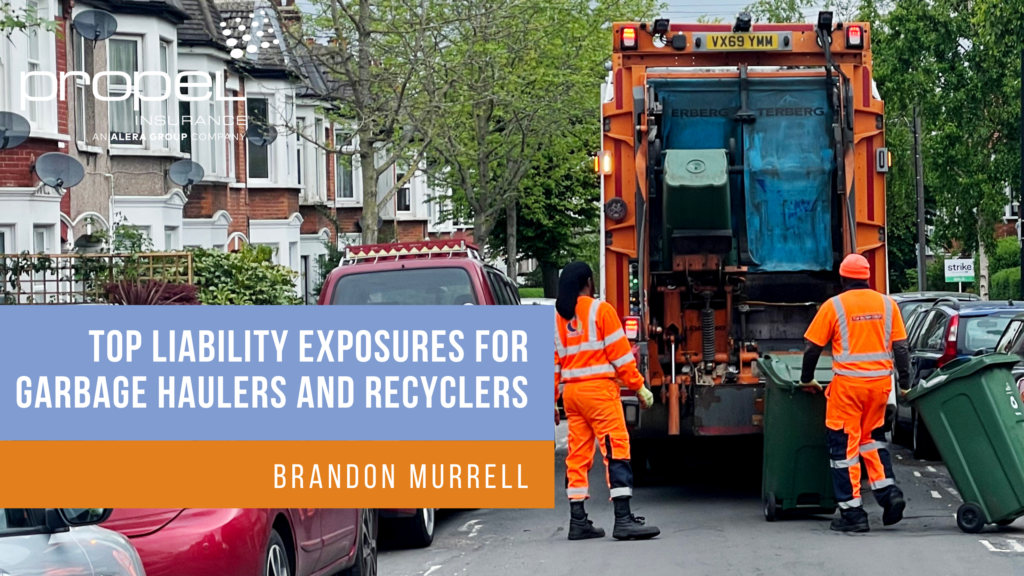Propel provides innovative insurance solutions to thousands of companies across the country. We make it our business to know your world inside and out.
Insights, Transportation
Top Liability Exposures for Garbage Haulers and Recyclers
Do you know what’s in your insurance policy? Because of common policy exclusions, some garbage and recycling haulers have more liability exposure than they realize. Take control of your risks by learning about the garbage industry’s top liability concerns and how typical insurance policies cover or exclude them.
How Claims Happen
Claims in the garbage and recycling sector often fall into three main categories:
- Auto Liability: Trash collection vehicles are large and unwieldy, creating many claim opportunities on the road. In collisions with other vehicles, motorcyclists, bicyclists, or pedestrians, the large size and heavy weight of the garbage collection vehicle may lead to serious property damage and bodily injury. In a tragic example of what can go wrong, KRON says a California man was taking a walk around his neighborhood when he was run over by a garbage truck that allegedly rolled through a stop sign. A wrongful death lawsuit has been filed against the garbage company. Fort Worth Report says a Texas waste management company is being sued for negligence over allegations that a driver failed to secure a load, which resulted in a crash.
- Pollution Liability: As Amwins explains, almost any material, substance, or product becomes pollution at the right quantity and under the right circumstances. the transportation sector faces significant pollution exposures. If a garbage truck catches fire or spills a load into a waterway or if a trash incinerator or recycling facility releases harmful substances into the environment, a pollution liability lawsuit may result. For example, Waste Today says Maryland is suing a waste management and recycling company for $2.1 million over claims it violated a stormwater discharge agreement.
- Worker Liability: Workers may file workers’ compensation claims if they are injured and they may file employment practices liability claims if they believe the company has violated their rights. For example, HR Drive says two waste management workers in Kansas are suing over what they claim to be a racially-hostile work environment. As another example, PLBH says a Los Angeles sanitation worker was awarded $17.4 million in a case involving wrongful termination and retaliation.
Common Insurance Exclusions
Business leaders often assume they don’t need to worry about lawsuits because they have insurance. Whereas it’s true that general liability, auto liability, and employment practices liability insurance will cover many common lawsuits, there are typically several gaps in coverage due to exclusions that are often vague or hard to find unless you have a competent broker who examines policy language and reviews the impact with the insured so it’s clear what exposures are covered and to what extent.
Pollution exclusions are especially common. In the past, commercial general liability insurance covered pollution claims, but this has changed in recent decades. The exclusions in many policies may now leave trash and recycling facilities exposed to uncovered lawsuits.
Many commercial general liability policies contain these three exclusions:
- Absolute pollution exclusion: Excludes coverage for claims involving pollution from regular business operations.
- Total pollution exclusion: Excludes almost all claims involving pollution, including bodily injury and property damage claims.
- Hostile fire clause: A hostile fire is one that becomes uncontrollable. Only policies that cover hostile fire pollution cover fumes from hostile fires.
Managing Your Risks
Securing insurance is an important part of risk management, but it is not always enough to control risks. Some additional steps will help:
- Know your policy’s exclusions and how to address them. It’s always better to have exclusions removed from your policy. However, you may be unable to secure coverage without some exclusions. It’s important that you understand which exclusions are in your policy and determine the best plan for addressing the coverage gap. Your plan may include additional risk management protocols or securing a separate pollution liability policy to bolster your protection. An added pollution policy may be especially important for high-risk organizations, such as landfills and recycling centers.
- Leverage telematics. Telematics programs give you vital insights into how your drivers are performing. Whereas training is important, it’s hard to know whether your drivers are practicing safe driving without telematics – until you have a crash.
- Invest in cameras. The National Insurance Crime Bureau says staged auto accidents have become a big business. If your drivers are targeted, cameras will help exonerate them. In addition to dashcams, consider adding in-cab cameras to show you that the driver is focused on the road and back-facing cameras to show collisions involving vehicles that rear-end your drivers.
- Mitigate pollution risks. Even substances that don’t seem particularly toxic may become hazardous when burned or released into water. Conduct a safety assessment and take appropriate measures.
- Prioritize safety. A culture of safety reduces risks on and off the road. Implement training and policies to prevent lifting injuries, avoid equipment-related incidents, foster safe driving, and protect workers against workplace violence. A safety consultant will help you assess your risks.
- Guard against nuclear verdicts. Large, so-called “nuclear” verdicts have been increasing liability exposures for transportation businesses. In addition to good driver safety practices, strong documentation and high liability limits can help safeguard your company.
Only a handful of insurance carriers provide the entire insurance package that garbage haulers need, and most of these options are available through Propel. In addition to our suite of garbage/recycling insurance and risk management solutions, we are members of several associations for recyclers and waste haulers in Oregon, Washington, and California. To learn more, contact Brandon Murrell.

Brandon is an accomplished insurance professional with over 11 years of experience in the industry. For seven years, he served as a Senior Large Loss Adjuster for the Western region of the United States, where he handled non-standard auto fatalities and large severity claims. Later, he transitioned into a role as a Direct Writer specializing in manufacturers, distributors, suppliers/wholesalers, and dealerships. More about Brandon...


